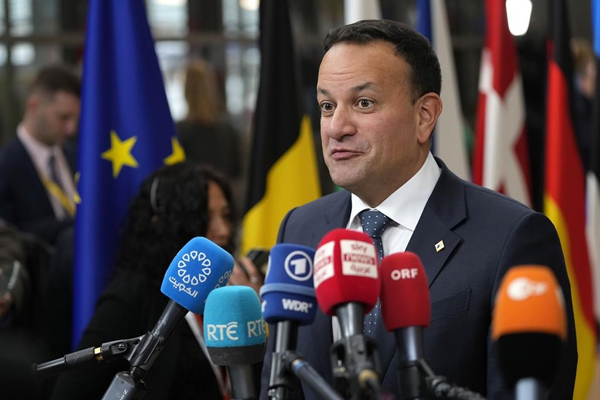BRUSSELS, Oct 26: European Union leaders gathered Thursday to debate ways to use their combined leverage to ensure that more aid reaches Palestinians in need, and how to help EU citizens in Gaza escape danger, including some held hostage by Hamas.
EU nations have long been divided in their approach to Israel and the Palestinians, but the brutal nature of the Hamas attack on Israel on October 7., which killed more than 1,400 people, and the hardship of civilians forced from their homes in Gaza have shone a bright spotlight on those divisions.
Across the EU spectrum, Austria, Germany and Hungary are among Israel’s top supporters. The leaders of Austria and Germany went to Israel to show solidarity after the assault.
Spain and Ireland often focus on the plight of the Palestinians. Hamas, for its part, is on the EU’s list of terrorist groups.
The challenge has been to strike a balance between condemning the Hamas attacks, supporting Israel’s right to defend itself and ensuring that the rights of civilians on both sides are protected under international law.
EU envoys have wrangled in recent days over whether to call for a “humanitarian pause” or “pauses,” or even a “window” in the fighting, to allow aid in.
Israel’s strongest backers oppose any language that might be seen to constrain its right to self-defense.
Meanwhile, the death toll in Gaza has soared past 7,000, according to Palestinian officials. It’s unprecedented in the decades-long Israeli-Palestinian conflict.
A draft of the leaders’ summit statement, seen by The Associated Press, sees them call “for continued, rapid, safe and unhindered humanitarian access and aid to reach those in need through all necessary measures including humanitarian corridors and pauses.”
Irish Prime Minister Leo Varadkar said: “I’m not obsessed about what language we use. What we want is the killing and the violence to stop; to stop so that humanitarian aid can get into Gaza, where Palestinian people are … Suffering, and also to allow us to get EU citizens out.”
He said that about 30 Irish Palestinian citizens are stuck. “We’re keen for them to be able to leave Gaza if they want to leave, and that’s currently not possible,” Varadkar told reporters.
Despite its limited political leverage, the 27-nation bloc is the world’s top aid supplier to the Palestinians.
It has sent almost 78 million euros (USD 82 million) this year and over 930 million euros (USD 982 million) since 2000.
The EU has little influence over Israel – the United States is its staunchest ally – but remains the country’s biggest trade partner.
The EU’s executive branch, the European Commission, has trumpeted what it calls an “air bridge” for Gaza – it consists of two plane loads of aid so far – and has demanded that more humanitarian assistance be allowed into poverty and conflict-hit Gaza.
In recent days, Israel has let more than 60 trucks with aid enter from Egypt. Aid workers and the EU say it’s not enough, just a tiny fraction of what came in before the war. Israel is still barring deliveries of fuel — needed to power generators — saying it believes that Hamas will take it.
A warning by the UN agency for Palestinian refugees, UNRWA, over waning fuel supplies has raised alarm that the humanitarian crisis could quickly worsen.
Gaza’s population has also been running out of food, water and medicine. The EU is UNRWA’s third biggest funder.
Dozens of European nationals are believed to be among the more than 200 Israelis and foreigners taken hostage by Hamas.
Scores more have been caught up in the turmoil as around 1.4 million of Gaza’s 2.3 million residents fled their homes under orders from the Israeli army.
Exact numbers are difficult to establish as some countries prefer not to provide them for security reasons. EU officials also declined to say.
Qatar has become a key interlocutor for countries hoping to have their captive nationals released.
EU officials have said that Turkey could also play an important role, underscoring the need for the bloc to maintain good relations with countries in the region, beyond Israel.
In the draft summit statement – perhaps due to the extreme security concerns – the leaders note only that they “reviewed the state of play and the follow-up on the different strands of action, including concerted efforts to assist EU citizens.” (AP)
Trending Now
E-Paper


